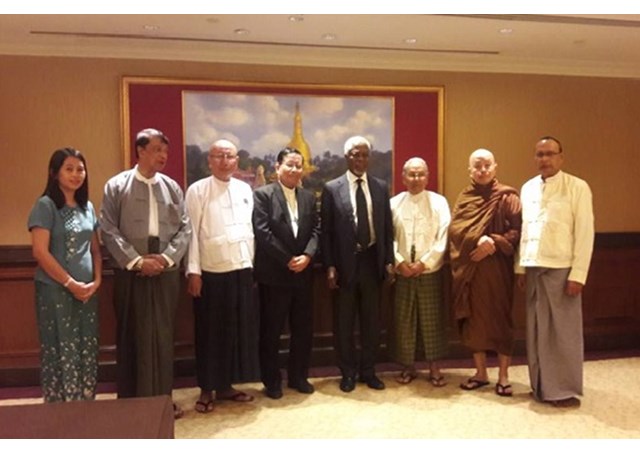
Myanmar: Kofi Annan meets Card. Bo and other religious leaders

Cardinal Charles Maung Bo of Yangon told Kofi Anan that religious leaders are there to help end the persecution of the Rohingya in Rakhine as well as the renewed ethnic fighting in Shan state. The prelate met with the former U.N. chief and other faith leaders during an hour-long meeting lead by the Rakhine Advisory Commission in Yangon on Thursday, Dec. 1.
"Cardinal Bo talked about the important role of religious leaders to bring about peace and reconciliation amid the Rakhine crisis and wars in northern Shan state," Father Dominic Zarbinus, the cardinal's secretary told ucanews.com. It's business as usual for the outspoken cardinal who has long been urging the authorities to bring justice to Myanmar.
The former United Nations chief Kofi Annan visited people displaced by ongoing conflict in an area near Myanmar's border with Bangladesh Saturday as head of a commission tasked with finding solutions to issues which have raised widespread international ire. The Advisory Commission on Rakhine had arrived in a northern part of the state where the army is accused of violence against members of the Rohingya Muslim minority.
"We cannot be silent on the oppression of our people either by the government or any other armed groups," Cardinal Bo said in a letter, circulated in June, adding that religious leaders need to believe in a "peaceful solution" to problems.
U Myint Swe, a Buddhist and president of Ratana Metta Organization, a Yangon-based NGO, attended Wednesday’s meeting and said that Annan asked for suggestions from religious leaders regarding the Rakhine persecution.
"Under Aung San Suu Kyi's government, the Rakhine crisis, ethnic conflict in northern Shan state, crime and child rape cases have erupted thanks to a group of opportunists who are attempting to undermine the reputation of the government," Myint Swe told ucanews.com.
The government established the Rakhine Advisory Commission, comprised of six local and three international experts to investigate problems in the state which the U.N. have said amount to ethnic cleansing.
The killing of nine police officers at three border posts in northern Rakhine on Oct. 9 resulted in a surge of violence by Myanmar's military, which operates separately from the civilian government led by State Counselor Aung San Suu Kyi.
International rights groups have accused the military of burning homes, arbitrary arrests, torture and rape but the government has continuously denied the allegations, claiming that the military has been hunting militants within legal limits.
Rohingya advocacy groups claim around 400 Rohingya were killed in the military operations in the north of the state, while Myanmar says just 91 -- 17 soldiers and 74 alleged "attackers" -- have been killed. The State Counselor Office Information Committee said in a statement Saturday that four of the 74 died during interrogation.
Suu Kyi's government established the commission to investigate the allegations bowing to weeks of international pressure. The commission chair is Vice President Myint Swe, who was the feared head of military intelligence under former leader General Than Shwe.
(Source: UCANews)
| All the contents on this site are copyrighted ©. |


